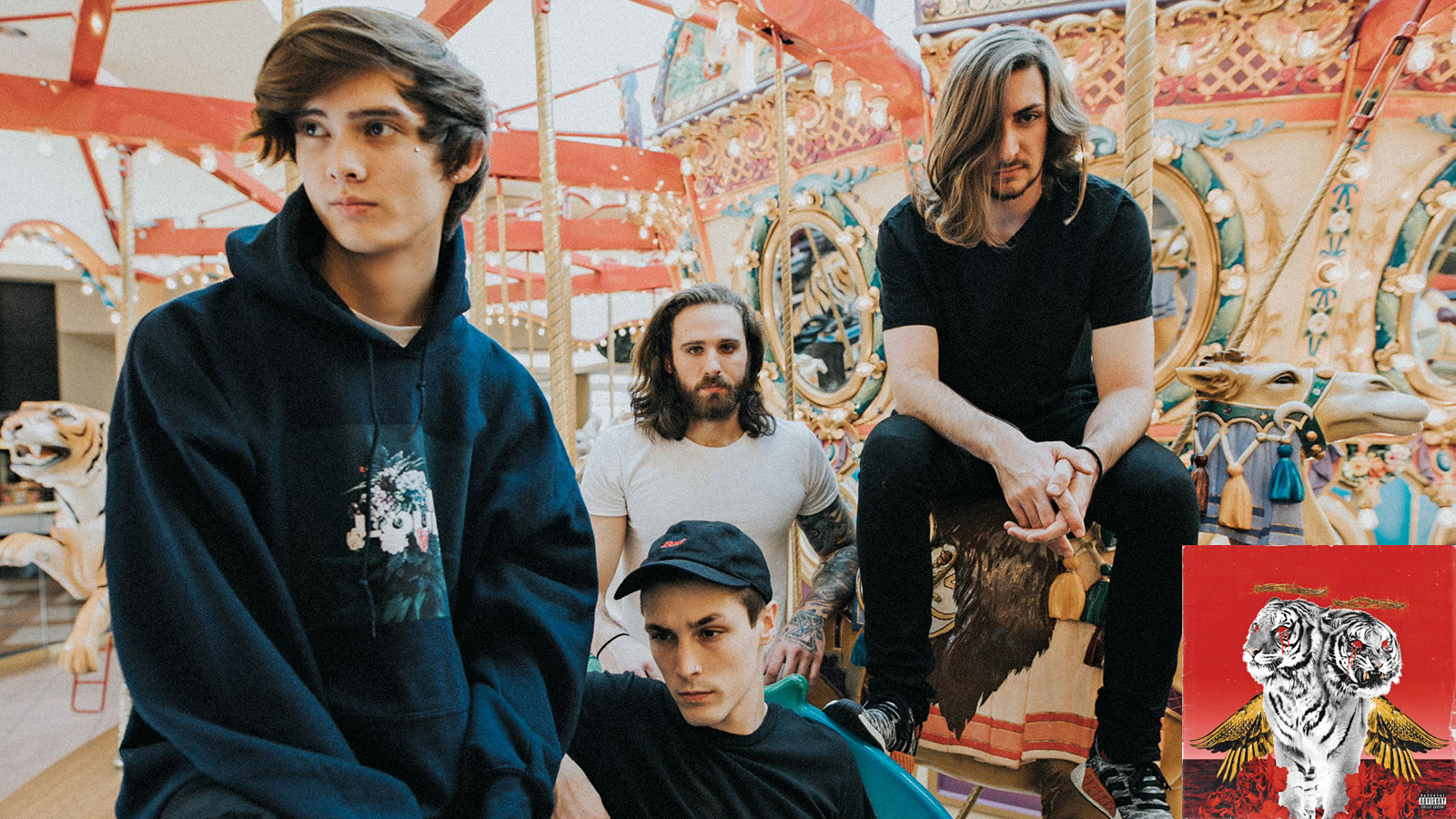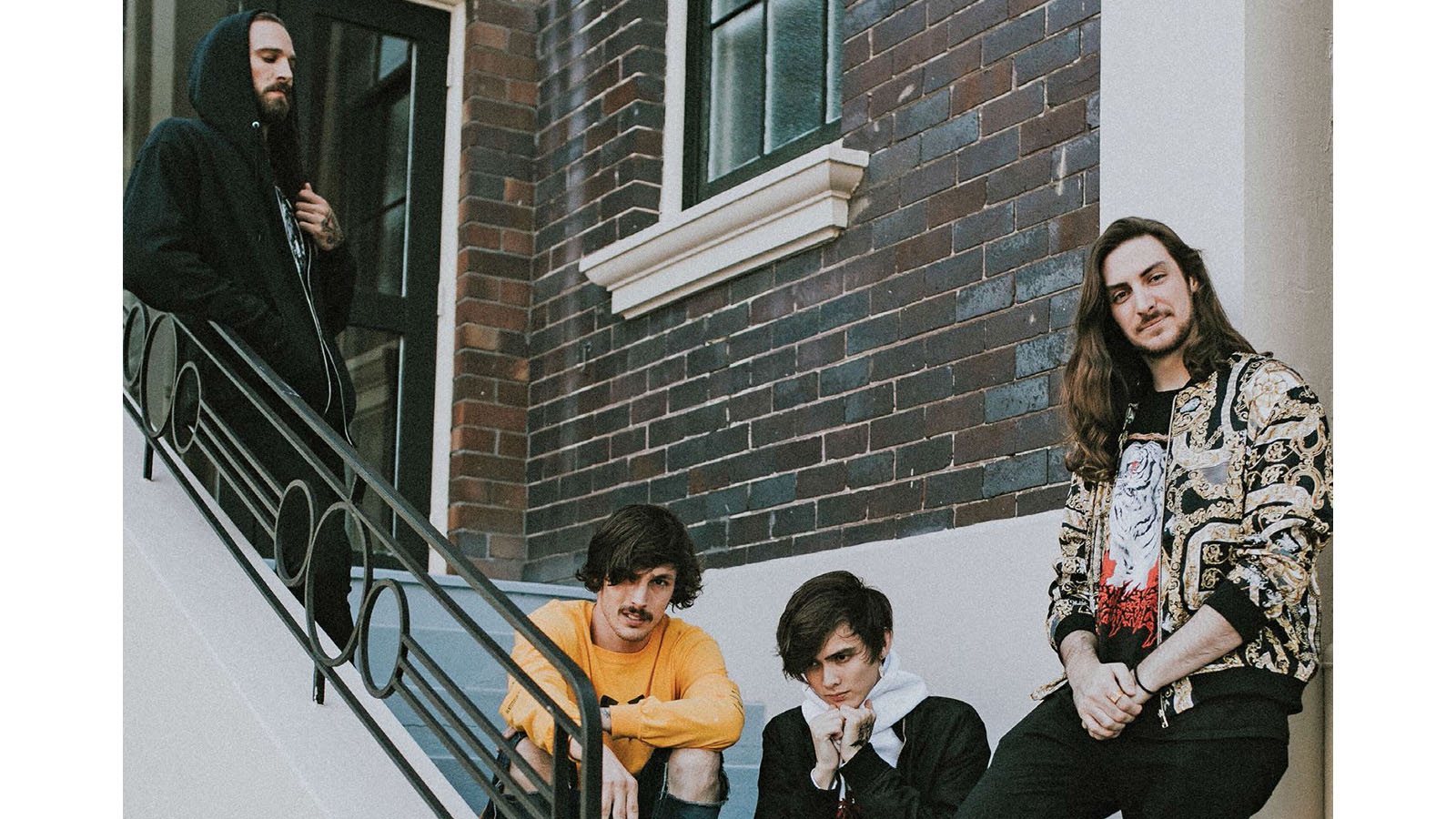All the latest guitar news, interviews, lessons, reviews, deals and more, direct to your inbox!
You are now subscribed
Your newsletter sign-up was successful
![[from left] Clay Aeschliman, Tim Henson, Clay Gober and Scott LePage](https://cdn.mos.cms.futurecdn.net/CjSkUnCj7zCe7wBDzn8yc9.jpg)
As its title suggests, Polyphia’s third full-length album, New Levels, New Devils, is packed with torrents of provocative instrumental genius and reckless daring-do. And that’s exactly what the Texas-based outfit intended. “We definitely want to fuck shit up,” says Tim Henson, who makes up one half of the band’s formidable guitar duo. “If something’s been done before, we want to turn it upside-down and mess with it. Too many bands just do the same things over and over. What’s the point? Be yourself. Be original. Otherwise, move out of the way and let somebody else have at it.”
Not one given to subtlety — or modesty — Henson doesn’t refrain from singing his own band’s praises. “I listen to our records all the time,” he says. “I think we’re very, very good.” He pauses, then adds with a laugh, “No, I think we’re great. If I were a kid, we would be my favorite band. That’s how cool our music is.”
His six-string co-conspirator, Scott LePage, is slightly more circumspect in analyzing Polyphia’s radical approach to instrumental shred, one that ditches the genre’s traditional focus on traditional rock rhythms for a hallucinogenic mélange of beats and soundscapes that comes off, at times, as decidedly anti-rock. “We just try to make music that we like,” he observes. “We started out as more of a shred band, but we put the brakes on that. Shred doesn’t have hip-hop beats, electronica shit and hooks, but that’s the stuff we love, so we went for it. So the only way to keep shred alive was to kill it and bring it back to life our own way.” He snickers somewhat fiendishly, then says, “It kind of pisses people off, but we’re having fun, so fuck it.”
Polyphia started to agitate their fans with the release of their first album, 2014’s Muse, which downplayed the stunning axe histrionics and prog arrangements of their debut EP, Inspire, in favor of hooks, atmospheric textures and hip-hop grooves. The band continued on this path on their next discs, 2016’s aptly named full-length Renaissance and an EP from 2017 that boasted the ballsy title of The Most Hated — on the latter they all but ditched guitars but ratcheted up the electronics.
“We knew our fans would hate The Most Hated — duh — because the guitar community fucking hates anything that isn’t guitar,” Henson says. “And they certainly don’t like hip-hop and electronic music. We don’t bend, though. We changed everything, and now everybody is going to try to jack our shit. But now we’re on to some new shit, so it just doesn’t matter.”
Despite the online gripes and raspberries for The Most Hated, Henson and Le Page love the disc, so, along with bassist Clay Gober and drummer Clay Aeschliman (two guys named Clay in one band — that’s a first), they aimed to replicate its trap and EDM foundations on New Levels New Devils while emphasizing guitars, bass and acoustic drums. Expertly guided by hip-hop/pop producers Y2K (Killy, Yung Bans) and Judge (Migos & Marshmello, Young Thug), the album features bracing guitar work by Henson and LePage along with a host of axe-wielding guests (among them are Ichika, Mateus Asato and Jason Richardson) on a wild pack of sonic creations that just don’t behave like normal songs. “O.D.” comes at you like a whirling dervish of lethal lines and savage rhythmic blows before it settles, albeit briefly, into a late-Eighties-style slow jam. “G.O.A.T.” is a trance-inducing array of shimmering, ethereal harmonics that dance about like fireflies on a hot summer night. And as for the album’s tour de force, “Nasty,” it’s a genre-defying hotbed of jagged chords and spindly leads that is capped off by Richardson’s outer-limits soloing.
“I have to say, we killed it on this album,” Henson says confidently. “If we had one overarching goal in making this record, it was to do whatever we like, and what we like happens to be the shit. When you go in with that kind of mindset, you’re bound to be fucking awesome.”
All the latest guitar news, interviews, lessons, reviews, deals and more, direct to your inbox!

It’s not surprising that you guys don’t seem to draw the typical shred crowd at your shows. There’s quite a few girls coming out.
TIM HENSON: Yeah, that’s awesome, isn’t it? It’s definitely, you know, inspiring. [laughs] We do this thing called “mobbing,” where we bring people on stage with us, a whole crowd. It’s kind of a hip-hop thing. We have 50 people on stage a lot of times, and a lot of girls. It’s a beautiful thing.
SCOTT LEPAGE: We don’t sit around and say, “Hey, let’s do something to bring chicks out to the shows.” We just try to make music everybody will enjoy. It’s cool to see girls are liking it, because let’s face it, that’s just cool. We don’t want to just focus on the guitar nerds.
Do you still find that some traditional shred fans are resistant to what you’re doing? Are they coming around a little?
LEPAGE: Some are and some aren’t. Some people just don’t want to embrace a new genre because they don’t know it. It takes them time to get with it. It’s like me and country music: My girlfriend likes it, but I can’t stand it. But man, I have to admit that Brad Paisley is a fucking sick guitarist. I could probably learn a thing or two from him. He’s wild!
HENSON: We’re aware of what people think. A lot of dudes can’t get into new concepts. It is what it is.
Let’s talk about your evolution. You both started out as metalheads, right?
LEPAGE: Pretty much. I started out way into Black Sabbath. Then I really got into Meshuggah. My dad and I listened to them all the time. Then I started listening to Stevie Ray Vaughan and played a lot of pentatonic blues. But I was probably more into technical metal growing up.
HENSON: I’m more Hendrix. He’s my idol. The dude headlined Woodstock, you know? That’s epic. I used to play the guitar behind my head, like he did. Scott and I both started out with Black Sabbath, but we both like listening to a lot of rap music. I primarily only listen to rap. After high school, I discovered Drake. He’s the biggest artist out there. Everything he does is cool as shit. Drake, man — you gotta love him.
What was the band’s thought process after Muse? Were there discussions that led you to move away from metal?
HENSON: It was just, “Let’s not be boring,” you know? At first, we wrote a shitload of metal. After Muse, it became more like we said, “Let’s try to make this more fun.” That got us into becoming more melody-based, and we found that we liked writing fun music. Shredding is cool, but after a while, so what?
LEPAGE: We knew we had to do something new. We shredded on Muse, but after that the hooks and choruses became more important. Songs need structure — that’s what makes them songs. Let’s face it: A guy who’s just shredding and doing nothing else isn’t super entertaining. Joe Satriani and Steve Vai kick ass because they’re O.G., but the wave of guitarists after them weren’t taking it anywhere new. So we just decided to go out there and make sick music.
You downplay shred, but you guys can still play your asses off. What do you do when you’re sitting down together? Do you practice? Do you show off cool new licks you wrote?
LEPAGE: I wouldn’t describe what we do as “practicing.”
HENSON: We should practice, but we don’t. We don’t even fucking practice that much before a tour.
LEPAGE: Well, we do a little of that, but not much. We write stuff and send it to each other. I just experiment with my own shit now, but I don’t really sit down and say, “OK, time to run up and down this scale all fucking day.” I don’t really dig doing that anymore.

Let’s talk about some of the new songs. “Nasty” is pretty hard to pin down genre-wise. What exactly is going on there?
LEPAGE: If you can’t pin it down, then we succeeded. [laughs]
HENSON: The song’s crazy. In the beginning, I’m running my guitar through a vocoder, which is the coolest thing ever. I laid out this whole chord progression, and the vocoder fucks with your sound. No matter what you play, it sounds super crazy. I want to do a whole album of that. Then it goes into this really dark, sinister-sounding riff with harmonics and bends and whammy things. I love the riffy section that Scott wrote. It’s super weird and nasty, hence the title. And Jason’s part is just Jason. He’s a sick dude.
LEPAGE: Having Jason on it was just perfect, because he’s hard as fuck. It’s got a pretty metal riff. I remember sitting on the bus writing it and saying, “How can I make this metal?” Then we got it figured out, and Y2K helped us out with it. He wrote a pretty sick beat. After that, we sent it to Jason, and he just destroyed it.
The rhythm playing on “Death Note” is wicked. It almost sounds as if James Hetfield were playing through a super-clean amp.
HENSON: That’s cool. I’m not a great rhythm player, but that one needed some cool shit. It was originally written on MIDI, so when we translated it to guitar we had to do something amazing. I added some chicken-picking things — done my own way. It ended up sounding really upbeat and fun.
LEPAGE: I like rhythm guitar — I think it’s tight. I fuck with lead playing, but Tim’s been doing this thing where he tries to incorporate the lead and the rhythm in one guitar riff.
Like on the beginning of “G.O.A.T.”
LEPAGE: Exactly. I think the rhythm section is important, so I focus a lot on it in terms of getting my chops up and shit. And what Tim does is so cool, man.
“Saucy” has some lines that sound backwards. Are you playing them that way, or are they digitally altered?
LEPAGE: No, we’re playing that shit straight-up.
HENSON: The stuff that sounds backwards is where we do these chordal sweeps. Instead of playing a chord normally, we kind of rake it. It’s not like sweep picking; it’s more of a raking technique. It sounds sick, man. You can rake up or down, and when you do four chords like that it sounds amazing.
LEPAGE: Sometimes I reverse some sections on guitar to see what they sounded like, but then I’d take them and record them. I didn’t do that on “Saucy,” though. I wanted it to be an all-out feel-good song.
Another “feel-good” song is “So Strange.” It’s the one track to feature vocals.
LEPAGE: Yeah, we have Cuco on that, and he’s brilliant. You have the chorus with singing on it, and everything else is guitars and stuff. When we heard Cuco’s vocals, we were tripping like, “Yeah, this is about super-strolling on the beach and eating ice cream cones.”
Strolling on the beach, ice cream cones — not very metal. Shouldn’t you guys be writing about hell, brute force and the devil, that sort of thing?
LEPAGE: Hell and brute force and the devil are fucking cool. We definitely love that shit. But if I had to choose between being on the beach with ice cream or hanging out with the devil, I’m going with the beach and ice cream.
HENSON: But it could be the devil walking down the beach with an ice cream cone. See what I did there? I combined everything. Pretty sneaky. [laughs]
Which kinds of guitars did you use on the album? A lot of Ibanez Prestiges, I presume?
LEPAGE: Yeah, dude. We like the Prestiges — they’re sick. We love the Talman Prestiges, and I have a couple Premiums I use often. They’re all sick. We’re kind of making the shift over to the Ibanez AZ. It’s an extremely versatile guitar, and you can get pretty much any sound you want out of it. I dig the humbucker on the bridge, and the single/single on the neck and middle. I think that really leads to a lot of different options as far as sound goes.
HENSON: We especially love when Ibanez does special things for us. We’re going to unveil something pretty cool at NAMM, but that’s all I can say right now.
Are you still using Orange amps and the Fractal Axe FX?
LEPAGE: For me, it’s Orange amp and Orange cab. We’ve got the Fractal AX8, and that’s just crazy. We definitely don’t use it to its full potential; we know that there’s so much shit that you can do with it. We’re pretty much just using the presets. I haven’t had the time to dive in and go crazy with it, but hopefully I will.
HENSON: I didn’t use amps — only the Fractal and a little bit of BIAS FX. The Axe FX is cool, but it’s in this big fucking box and that can be a pain in the ass to travel with. If I’m writing at my computer, I can use the BIAS and get some super-awesome tones.
How are the new songs going over live?
HENSON: I’ve got to say, the stuff is killin’ it live. We’ve got stuff that’s party-banger songs, and then we do stuff that’s more head-bobby, and the crowds are way into it. We get the people mobbing and crowd-surfing, but we don’t want them to beat the shit out of each other. Just kind of roll around each other and have a good time — that’s what we’re into.
Joe is a freelance journalist who has, over the past few decades, interviewed hundreds of guitarists for Guitar World, Guitar Player, MusicRadar and Classic Rock. He is also a former editor of Guitar World, contributing writer for Guitar Aficionado and VP of A&R for Island Records. He’s an enthusiastic guitarist, but he’s nowhere near the likes of the people he interviews. Surprisingly, his skills are more suited to the drums. If you need a drummer for your Beatles tribute band, look him up.

